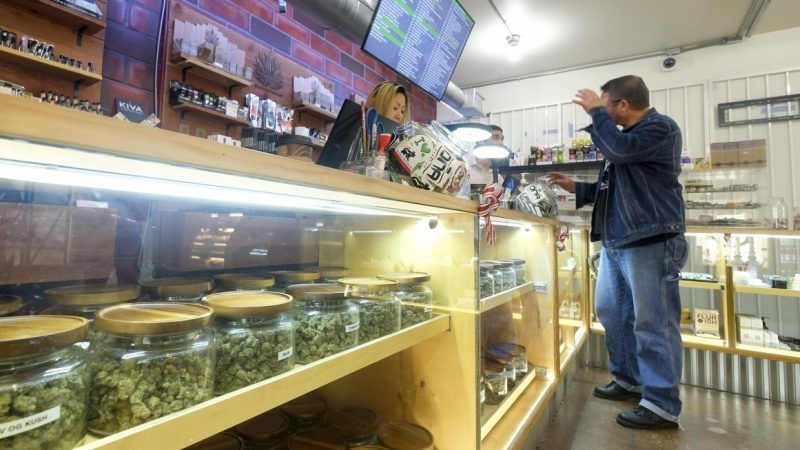California Has Completely Crapped the Bed Rolling Out Legal Marijuana
The black market still dominates. And more enforcement and fines aren’t going to fix it.

Thanks to high taxes and overregulation, California reportedly has three times as many illegal marijuana dispensaries as it does licensed shops.
And that's probably an undercount. The numbers—873 legal vs. 2,835 unlicensed—come from a marijuana dispensary trade association that made its calculations by looking at who is advertising on Weedmaps, a site helping pot users order marijuana from dispensaries online. There's probably more than a few unlicensed dispensaries out there who don't advertise on Weedmaps either.
The trade association that provided this count, the United Cannabis Business Association (UCBA), has a mad-on for Weedmaps because it has been allowing unlicensed dispensaries to use its platform. The UCBA, which already pushed through a law increasing the fines on unlicensed vendors, is now lobbying for a bill that would prohibit sites like Weedmaps from hosting advertisements from unlicensed dispensaries, enforced by even more fines.
The Los Angeles Times reports that the state has served 19 search warrants and has seized more than $16.5 million in unlicensed marijuana products this year. That's barely even a drop in the bucket. One marijuana industry market research firm predicts about $3 billion in marijuana sales through licensed dispensaries in California and a whopping $8.7 billion in sales through illegal pot operations this year.
Both the state and local governments lump a host of taxes on legal marijuana sales, driving the prices up by more than 30 percent in many places. And in Los Angeles, the city has been dragging its feet when it comes to actually licensing people who want to open legally operating storefronts. The city has received more than 1,600 applications to operate legally, but it has licensed only 187 so far this year. Only now, in September—nine months after it became legal to operate recreational marijuana dispensaries—is it going to approve 100 additional licenses.
If these folks are going through the effort to invest in storefronts or in on-call delivery services and apply for licenses rather than lurking on street corners, it would seem like they actually want to operate legally. But the government has made it too costly for them to do so. And rather than making it easier for these folks to get licenses, UCBA and city leaders are promoting punitive responses, calling for bigger fines and more enforcement. The City of Los Angeles even went so far as to shut down the utilities of illegal dispensaries and do perp walks of the people they arrested. Yet it's largely the city's own fault that it can't get its act together to hand out the licenses people are asking for.
Meanwhile, the UCBA is acting like the taxi cartels that fight ridesharing services because they don't want to lose customers to cheaper competitors. It is true that UCBA members followed the regulations to operate legally. It's also clear that they have a lot of influence on what those regulations are. Their team includes several lobbyists and lawyers who are experts on licensing. These organizations stand to gain by punishing unlicensed dealers and the sites that help advertise them. They want more of that $8.7 billion flowing in their direction.
We're talking about marijuana here. After decades of a failed drug war, it's comically absurd to think a state or city can somehow wipe out illegal pot sales now when it was unable to do so before. Black markets persist when it becomes too difficult for consumers to purchase what they want legally. How many times do we need to learn this lesson?


Show Comments (53)